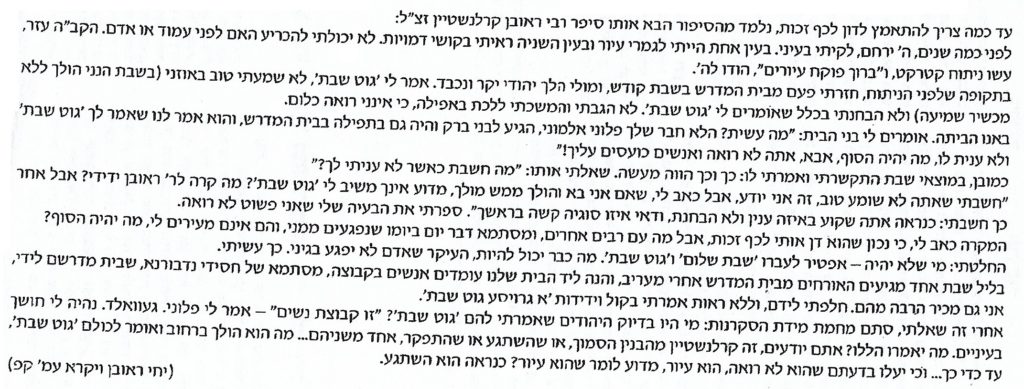The Breslover ‘Hiskashrus’ Before Prayer: A Defense
I was posed a whole bunch of difficulties on Breslov in a letter.
An excerpt:
I don’t know how your reaction to this would be, as you do seem to be somewhat of a Breslov sympathizer (no, obviously I don’t mean of all current practitioners, or those who claim to be…). On the other hand, you do seem to be interested in emes, even when (or perhaps especially when?) not politically correct.Maybe similar things can be found in other Chassidish writings – I remember seeing as a bochur some Chabad piece about “hiskashrus” to a/the Rebbe that also would be (similarly) hard to swallow for someone with a classic Jewish education…)Is everything just written off as “bechinos“?…
Now, I will not answer all in beautiful fashion, partly for the same reason Jews had trouble weighing in on the Protestant revolt against the papists, a pox on both their houses. If I explain matters too well, the obvious question will then be why I don’t adopt the thing I defend, myself…
But the reader’s chief problem seems to be the Breslover “Hareini Mikasher” said before prayer. Rumor has various famous rabbis saying this does\can either lead to\is the same as idol worship.
“Breslov sympathizer” or not, the responsible course here would be to ask a knowledgeable Breslover or two, consult Likutei Moharan’s commentaries, and perhaps check Likutei Halachos (Nachalos 4?). Not doing that. But here is one layman’s answer.
The source for the concept is in Likutei Moharan volume I 2:6:
וצריך כל אחד לכון בתפלתו, שיקשר עצמו לצדיקים שבדור, כי כל צדיק שבדור הוא בחינת משה משיח, כמו שמצינו, שהצדיקים קורין זה לזה משה, כמו ‘משה שפיר קאמרת’. ומשה זה בחינת משיח, כמו שכתוב: “עד כי יבא שילה” ‘דא משה משיח’.
וכל תפלה ותפלה שכל אחד מתפלל הוא בחינת איבר מהשכינה, שהם אברי המשכן, שאין שום אחד מישראל יכול לאעלא שיפא בשיפא כל חד לדוכתיה, אלא משה בלחוד, בשביל זה צריך להביא ולקשר כל התפלות לצדיק הדור, כמו שכתוב: “ויביאו את המשכן אל משה”. והוא יודע לאעלא שיפא בשיפא ולעשות אותה קומה שלמה, כמו שכתוב: “ויקם משה את המשכן”.
And again in Likutei Moharan volume I 9:4:
וצריך כל אדם לקשר את תפלתו לצדיק הדור. והצדיק יודע לכון השערים ולהעלות כל תפלה ותפלה לשער השיך. כי כל צדיק וצדיק הוא בחינת משה – משיח, כמו שאמרו ‘משה, שפיר קאמרת’, וכתיב: “עד כי יבא שילה” ‘דא משה’; ומשיח הוא כלול כל התפלות, ובשביל זה יהיה משיח ‘מורח ודאין’, כי התפלות הם בחינת חטם, כמו שכתוב: “ותהלתי אחטם לך”.
Sichos Haran [Breslov] 296:
בשעת התפלה צריכין לקשר עצמו להצדיקים שבדור כמובא בסימן ב’ ובסימן ט’ ב”לקוטי מוהר”ן” חלק ראשון ובשאר מקומות. על כן הזהיר לאנשיו שיאמרו קדם התפלה הריני מקשר עצמי לכל הצדיקים שבדורנו.
This instruction is not a secret, either, mentioned prominently in Reb Nosson of Nemirov’s introduction to Likutei Moharan.
What does “Hiskashrus” mean? Love. That’s generally the definition of the word in Breslov lingo (see, for example, “mekushar latzaddik” in the context of Likutei Moharan I 8:2, and especially ibid. I 135.)
If anything, the question should be, why even mention this, since the Arizal already says the same thing: accept the commandment of “ואהבת לרעך כמוך” (which means righteous Jews, of course) before Shemoneh Esrei. But here is added “Hiskashrus” in the intercessory sense (famously corrupted by Lubavitch into genuine idolatry: asking the “intermediate-intermediary” Rebbe (or “father-in-law”) to do XYZ from afar, even while alive), but that is taken as happening elsewhere somehow. Practically speaking, “Hiskashrus” for the reader is just feeling love for righteous Jews right before speaking to צדיקו של עולם.
(Rabbi Gedalya Kenig’s Chayei Nefesh reportedly says this means that he intends to pray with the proper intention, same as the righteous.)
Of course, there is much more to the concept of “Tzaddik” in Breslov, a topic for a whole new discussion.
Finally, a word on “Bechinos”. Modern idolaters use the identical line to escape the charge of idol worship (worshipping the Sun became “saluting” the sun; the idol merely “symbolizes” and channels divinity, etc.). Doesn’t work.
ליקוטי הלכות [ברסלב] על ברכת השחר הלכה ג’:
רק שזה ידוע שכל בחינה כלולה מכל הבחינות, כמבאר בכתבי האריז”ל כמה פעמים שכל שם וכל בחינה וכל ספירה וכו’ כלולה מכל השמות ומכל הבחינות…

